NURSE8732 Literature Review: Psychosocial Self-Management of Diabetes
VerifiedAdded on 2022/08/14
|41
|9800
|13
Literature Review
AI Summary
This literature review, prepared for NURSE8732, examines strategies to improve psychosocial self-management skills among adults with Type 2 Diabetes living in rural and remote areas of Australia. The review highlights the challenges faced by this population, including limited access to services and culturally inappropriate care, particularly for Indigenous communities. The research question focuses on identifying effective strategies to enhance self-management. The methodology involves a PRISMA framework and a search of databases such as CINAHL, Medline, and PubMed. Inclusion and exclusion criteria are applied to select relevant peer-reviewed articles published within the last 10 years. The selected articles are critically appraised using the CASP tool. Key themes emerging from the literature include the importance of community health workers, peer support programs, and culturally appropriate interventions. The review emphasizes the integration of psychosocial care with a patient-centered approach to improve health outcomes and reduce the complications associated with Type 2 Diabetes, such as cardiovascular disease, kidney disease, and premature death. The findings underscore the need for tailored interventions that address the unique social, economic, and cultural contexts of rural Australian communities.
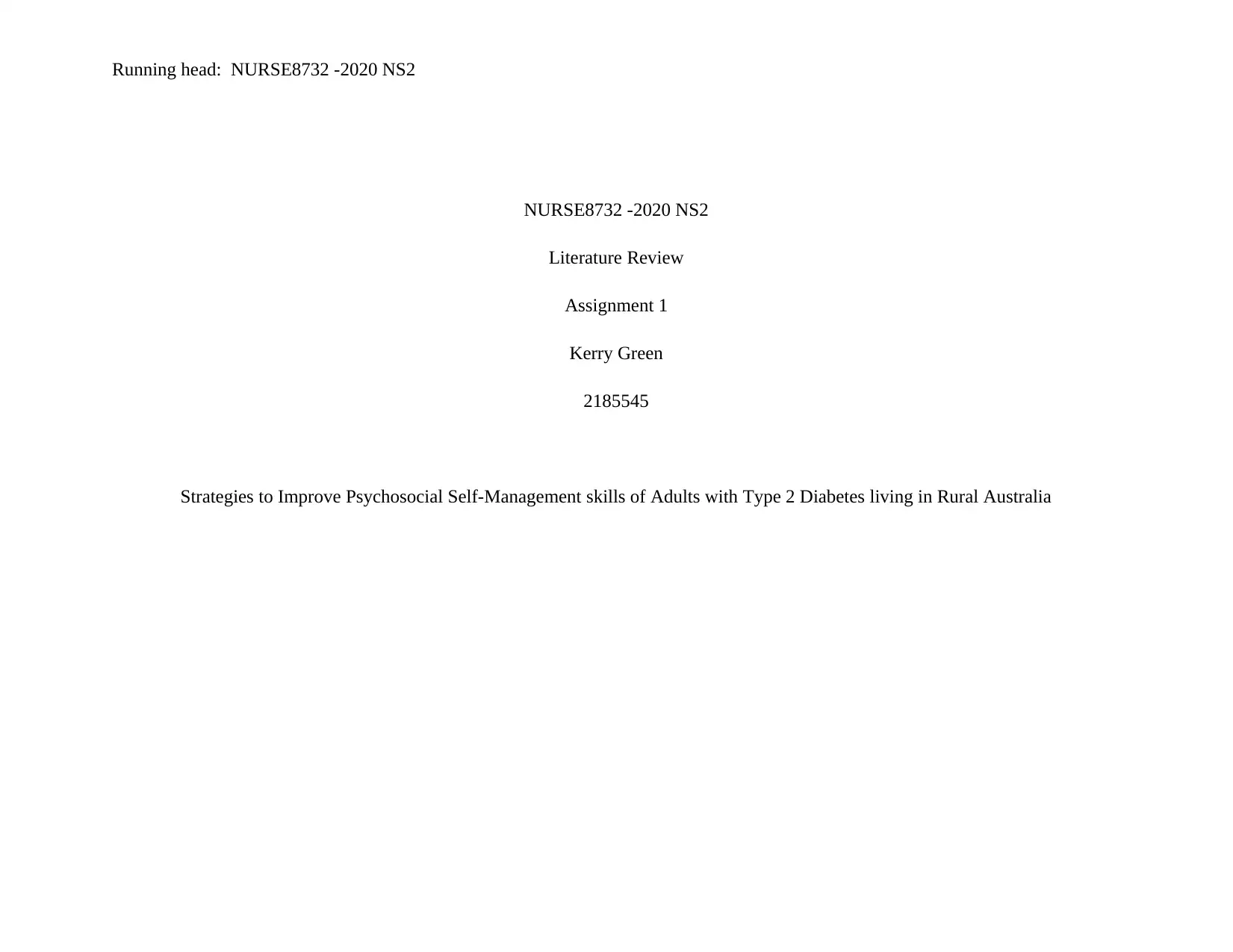
Running head: NURSE8732 -2020 NS2
NURSE8732 -2020 NS2
Literature Review
Assignment 1
Kerry Green
2185545
Strategies to Improve Psychosocial Self-Management skills of Adults with Type 2 Diabetes living in Rural Australia
NURSE8732 -2020 NS2
Literature Review
Assignment 1
Kerry Green
2185545
Strategies to Improve Psychosocial Self-Management skills of Adults with Type 2 Diabetes living in Rural Australia
Paraphrase This Document
Need a fresh take? Get an instant paraphrase of this document with our AI Paraphraser
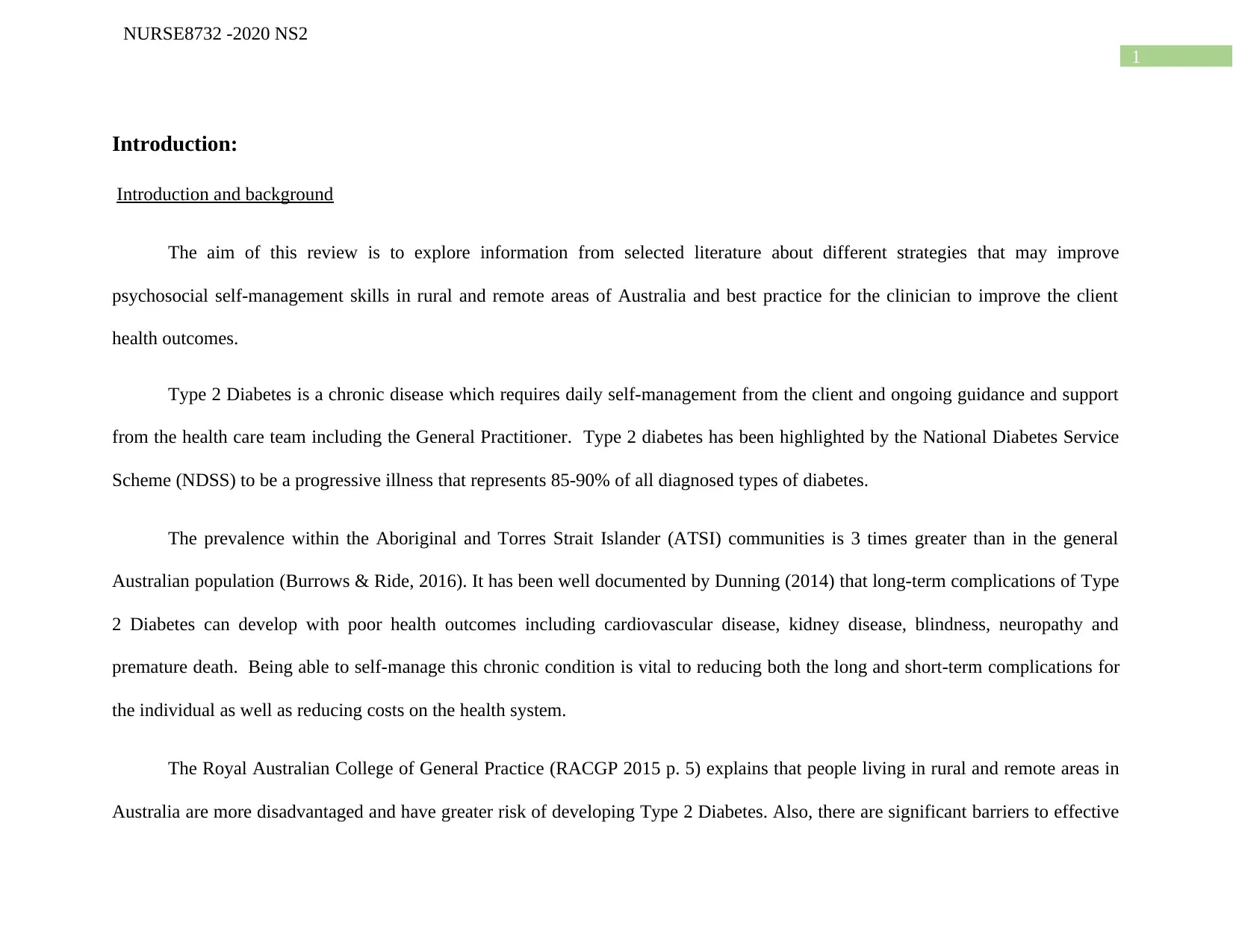
1
NURSE8732 -2020 NS2
Introduction:
Introduction and background
The aim of this review is to explore information from selected literature about different strategies that may improve
psychosocial self-management skills in rural and remote areas of Australia and best practice for the clinician to improve the client
health outcomes.
Type 2 Diabetes is a chronic disease which requires daily self-management from the client and ongoing guidance and support
from the health care team including the General Practitioner. Type 2 diabetes has been highlighted by the National Diabetes Service
Scheme (NDSS) to be a progressive illness that represents 85-90% of all diagnosed types of diabetes.
The prevalence within the Aboriginal and Torres Strait Islander (ATSI) communities is 3 times greater than in the general
Australian population (Burrows & Ride, 2016). It has been well documented by Dunning (2014) that long-term complications of Type
2 Diabetes can develop with poor health outcomes including cardiovascular disease, kidney disease, blindness, neuropathy and
premature death. Being able to self-manage this chronic condition is vital to reducing both the long and short-term complications for
the individual as well as reducing costs on the health system.
The Royal Australian College of General Practice (RACGP 2015 p. 5) explains that people living in rural and remote areas in
Australia are more disadvantaged and have greater risk of developing Type 2 Diabetes. Also, there are significant barriers to effective
NURSE8732 -2020 NS2
Introduction:
Introduction and background
The aim of this review is to explore information from selected literature about different strategies that may improve
psychosocial self-management skills in rural and remote areas of Australia and best practice for the clinician to improve the client
health outcomes.
Type 2 Diabetes is a chronic disease which requires daily self-management from the client and ongoing guidance and support
from the health care team including the General Practitioner. Type 2 diabetes has been highlighted by the National Diabetes Service
Scheme (NDSS) to be a progressive illness that represents 85-90% of all diagnosed types of diabetes.
The prevalence within the Aboriginal and Torres Strait Islander (ATSI) communities is 3 times greater than in the general
Australian population (Burrows & Ride, 2016). It has been well documented by Dunning (2014) that long-term complications of Type
2 Diabetes can develop with poor health outcomes including cardiovascular disease, kidney disease, blindness, neuropathy and
premature death. Being able to self-manage this chronic condition is vital to reducing both the long and short-term complications for
the individual as well as reducing costs on the health system.
The Royal Australian College of General Practice (RACGP 2015 p. 5) explains that people living in rural and remote areas in
Australia are more disadvantaged and have greater risk of developing Type 2 Diabetes. Also, there are significant barriers to effective
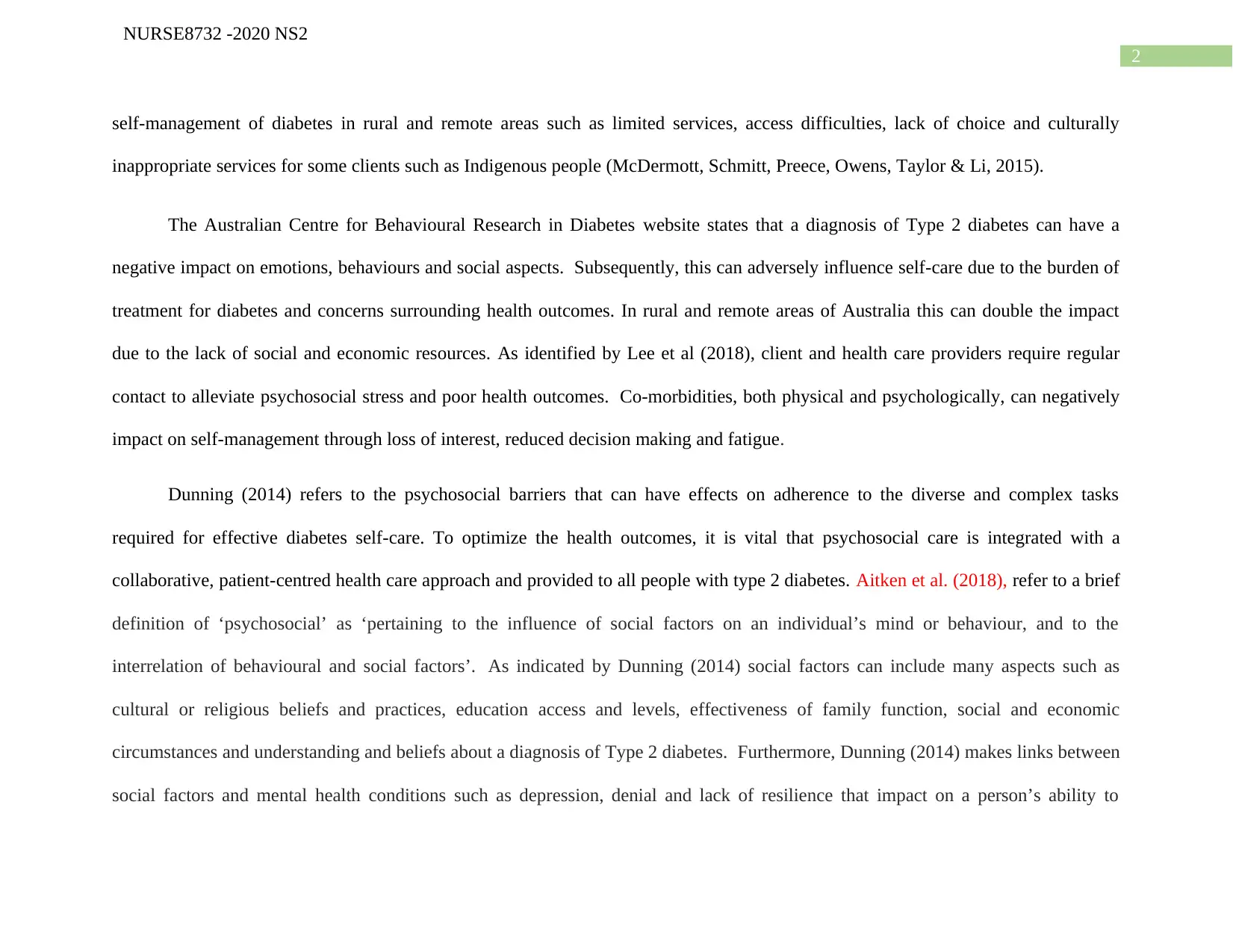
2
NURSE8732 -2020 NS2
self-management of diabetes in rural and remote areas such as limited services, access difficulties, lack of choice and culturally
inappropriate services for some clients such as Indigenous people (McDermott, Schmitt, Preece, Owens, Taylor & Li, 2015).
The Australian Centre for Behavioural Research in Diabetes website states that a diagnosis of Type 2 diabetes can have a
negative impact on emotions, behaviours and social aspects. Subsequently, this can adversely influence self-care due to the burden of
treatment for diabetes and concerns surrounding health outcomes. In rural and remote areas of Australia this can double the impact
due to the lack of social and economic resources. As identified by Lee et al (2018), client and health care providers require regular
contact to alleviate psychosocial stress and poor health outcomes. Co-morbidities, both physical and psychologically, can negatively
impact on self-management through loss of interest, reduced decision making and fatigue.
Dunning (2014) refers to the psychosocial barriers that can have effects on adherence to the diverse and complex tasks
required for effective diabetes self-care. To optimize the health outcomes, it is vital that psychosocial care is integrated with a
collaborative, patient-centred health care approach and provided to all people with type 2 diabetes. Aitken et al. (2018), refer to a brief
definition of ‘psychosocial’ as ‘pertaining to the influence of social factors on an individual’s mind or behaviour, and to the
interrelation of behavioural and social factors’. As indicated by Dunning (2014) social factors can include many aspects such as
cultural or religious beliefs and practices, education access and levels, effectiveness of family function, social and economic
circumstances and understanding and beliefs about a diagnosis of Type 2 diabetes. Furthermore, Dunning (2014) makes links between
social factors and mental health conditions such as depression, denial and lack of resilience that impact on a person’s ability to
NURSE8732 -2020 NS2
self-management of diabetes in rural and remote areas such as limited services, access difficulties, lack of choice and culturally
inappropriate services for some clients such as Indigenous people (McDermott, Schmitt, Preece, Owens, Taylor & Li, 2015).
The Australian Centre for Behavioural Research in Diabetes website states that a diagnosis of Type 2 diabetes can have a
negative impact on emotions, behaviours and social aspects. Subsequently, this can adversely influence self-care due to the burden of
treatment for diabetes and concerns surrounding health outcomes. In rural and remote areas of Australia this can double the impact
due to the lack of social and economic resources. As identified by Lee et al (2018), client and health care providers require regular
contact to alleviate psychosocial stress and poor health outcomes. Co-morbidities, both physical and psychologically, can negatively
impact on self-management through loss of interest, reduced decision making and fatigue.
Dunning (2014) refers to the psychosocial barriers that can have effects on adherence to the diverse and complex tasks
required for effective diabetes self-care. To optimize the health outcomes, it is vital that psychosocial care is integrated with a
collaborative, patient-centred health care approach and provided to all people with type 2 diabetes. Aitken et al. (2018), refer to a brief
definition of ‘psychosocial’ as ‘pertaining to the influence of social factors on an individual’s mind or behaviour, and to the
interrelation of behavioural and social factors’. As indicated by Dunning (2014) social factors can include many aspects such as
cultural or religious beliefs and practices, education access and levels, effectiveness of family function, social and economic
circumstances and understanding and beliefs about a diagnosis of Type 2 diabetes. Furthermore, Dunning (2014) makes links between
social factors and mental health conditions such as depression, denial and lack of resilience that impact on a person’s ability to
⊘ This is a preview!⊘
Do you want full access?
Subscribe today to unlock all pages.

Trusted by 1+ million students worldwide
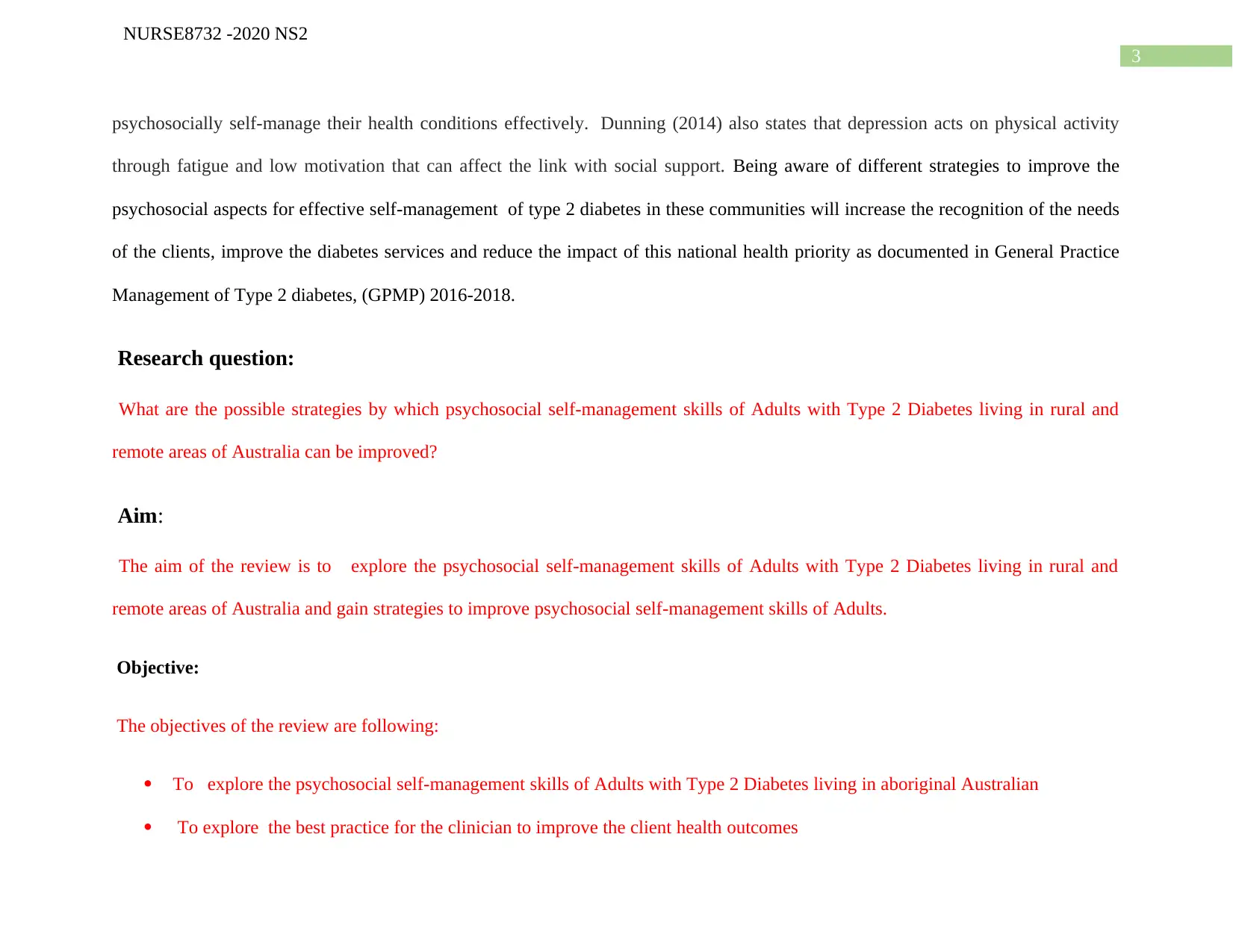
3
NURSE8732 -2020 NS2
psychosocially self-manage their health conditions effectively. Dunning (2014) also states that depression acts on physical activity
through fatigue and low motivation that can affect the link with social support. Being aware of different strategies to improve the
psychosocial aspects for effective self-management of type 2 diabetes in these communities will increase the recognition of the needs
of the clients, improve the diabetes services and reduce the impact of this national health priority as documented in General Practice
Management of Type 2 diabetes, (GPMP) 2016-2018.
Research question:
What are the possible strategies by which psychosocial self-management skills of Adults with Type 2 Diabetes living in rural and
remote areas of Australia can be improved?
Aim:
The aim of the review is to explore the psychosocial self-management skills of Adults with Type 2 Diabetes living in rural and
remote areas of Australia and gain strategies to improve psychosocial self-management skills of Adults.
Objective:
The objectives of the review are following:
To explore the psychosocial self-management skills of Adults with Type 2 Diabetes living in aboriginal Australian
To explore the best practice for the clinician to improve the client health outcomes
NURSE8732 -2020 NS2
psychosocially self-manage their health conditions effectively. Dunning (2014) also states that depression acts on physical activity
through fatigue and low motivation that can affect the link with social support. Being aware of different strategies to improve the
psychosocial aspects for effective self-management of type 2 diabetes in these communities will increase the recognition of the needs
of the clients, improve the diabetes services and reduce the impact of this national health priority as documented in General Practice
Management of Type 2 diabetes, (GPMP) 2016-2018.
Research question:
What are the possible strategies by which psychosocial self-management skills of Adults with Type 2 Diabetes living in rural and
remote areas of Australia can be improved?
Aim:
The aim of the review is to explore the psychosocial self-management skills of Adults with Type 2 Diabetes living in rural and
remote areas of Australia and gain strategies to improve psychosocial self-management skills of Adults.
Objective:
The objectives of the review are following:
To explore the psychosocial self-management skills of Adults with Type 2 Diabetes living in aboriginal Australian
To explore the best practice for the clinician to improve the client health outcomes
Paraphrase This Document
Need a fresh take? Get an instant paraphrase of this document with our AI Paraphraser
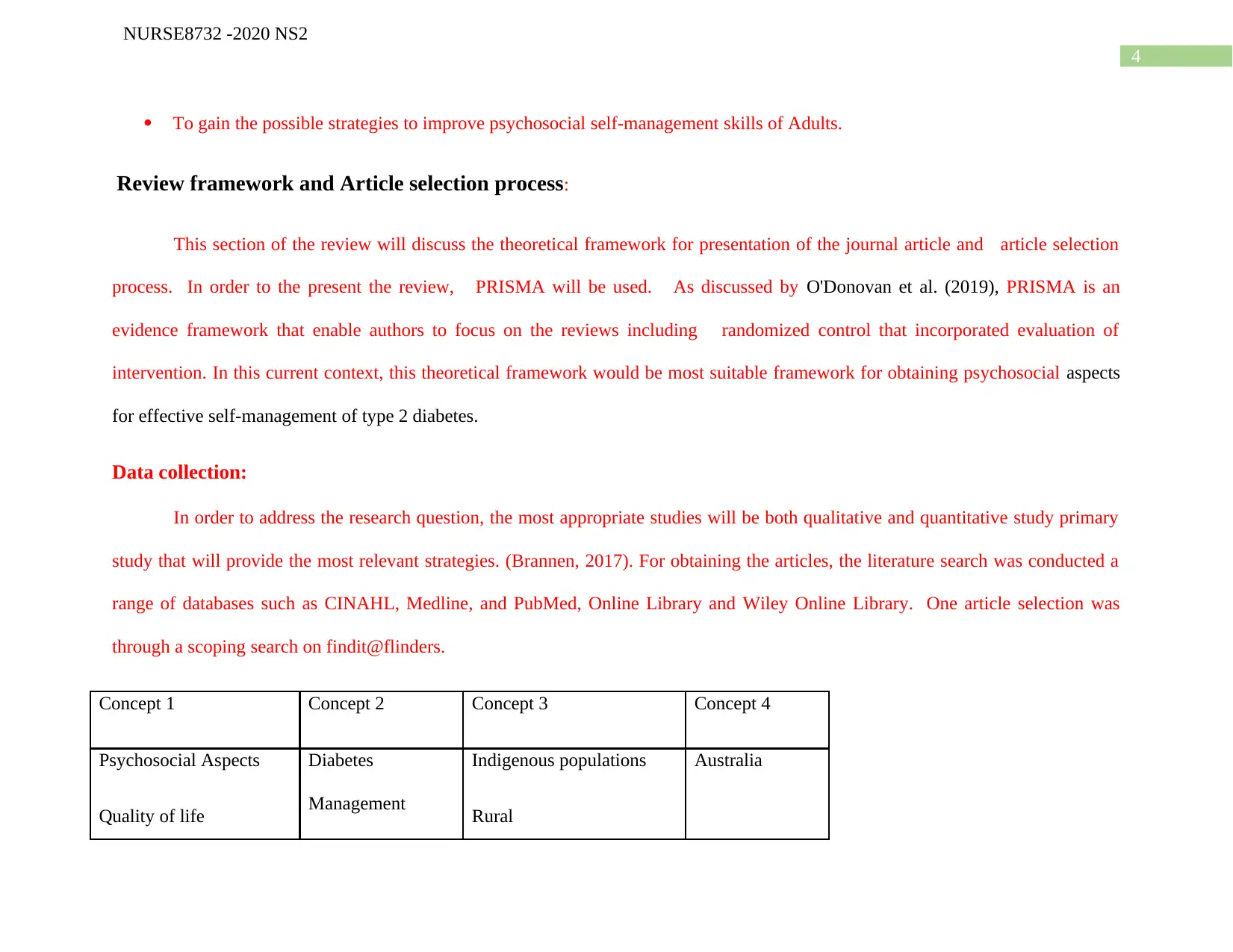
4
NURSE8732 -2020 NS2
To gain the possible strategies to improve psychosocial self-management skills of Adults.
Review framework and Article selection process:
This section of the review will discuss the theoretical framework for presentation of the journal article and article selection
process. In order to the present the review, PRISMA will be used. As discussed by O'Donovan et al. (2019), PRISMA is an
evidence framework that enable authors to focus on the reviews including randomized control that incorporated evaluation of
intervention. In this current context, this theoretical framework would be most suitable framework for obtaining psychosocial aspects
for effective self-management of type 2 diabetes.
Data collection:
In order to address the research question, the most appropriate studies will be both qualitative and quantitative study primary
study that will provide the most relevant strategies. (Brannen, 2017). For obtaining the articles, the literature search was conducted a
range of databases such as CINAHL, Medline, and PubMed, Online Library and Wiley Online Library. One article selection was
through a scoping search on findit@flinders.
Concept 1 Concept 2 Concept 3 Concept 4
Psychosocial Aspects
Quality of life
Diabetes
Management
Indigenous populations
Rural
Australia
NURSE8732 -2020 NS2
To gain the possible strategies to improve psychosocial self-management skills of Adults.
Review framework and Article selection process:
This section of the review will discuss the theoretical framework for presentation of the journal article and article selection
process. In order to the present the review, PRISMA will be used. As discussed by O'Donovan et al. (2019), PRISMA is an
evidence framework that enable authors to focus on the reviews including randomized control that incorporated evaluation of
intervention. In this current context, this theoretical framework would be most suitable framework for obtaining psychosocial aspects
for effective self-management of type 2 diabetes.
Data collection:
In order to address the research question, the most appropriate studies will be both qualitative and quantitative study primary
study that will provide the most relevant strategies. (Brannen, 2017). For obtaining the articles, the literature search was conducted a
range of databases such as CINAHL, Medline, and PubMed, Online Library and Wiley Online Library. One article selection was
through a scoping search on findit@flinders.
Concept 1 Concept 2 Concept 3 Concept 4
Psychosocial Aspects
Quality of life
Diabetes
Management
Indigenous populations
Rural
Australia
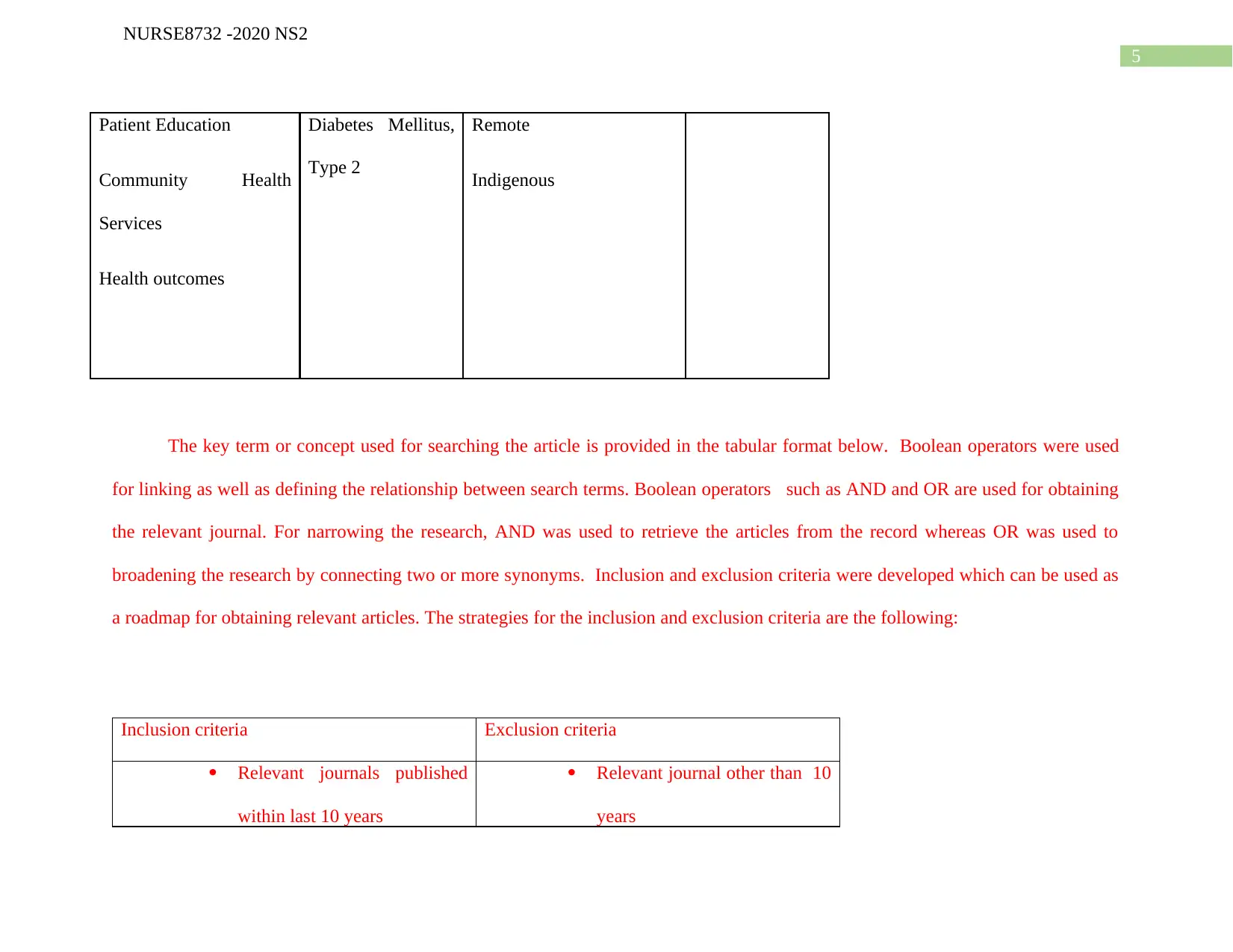
5
NURSE8732 -2020 NS2
Patient Education
Community Health
Services
Health outcomes
Diabetes Mellitus,
Type 2
Remote
Indigenous
The key term or concept used for searching the article is provided in the tabular format below. Boolean operators were used
for linking as well as defining the relationship between search terms. Boolean operators such as AND and OR are used for obtaining
the relevant journal. For narrowing the research, AND was used to retrieve the articles from the record whereas OR was used to
broadening the research by connecting two or more synonyms. Inclusion and exclusion criteria were developed which can be used as
a roadmap for obtaining relevant articles. The strategies for the inclusion and exclusion criteria are the following:
Inclusion criteria Exclusion criteria
Relevant journals published
within last 10 years
Relevant journal other than 10
years
NURSE8732 -2020 NS2
Patient Education
Community Health
Services
Health outcomes
Diabetes Mellitus,
Type 2
Remote
Indigenous
The key term or concept used for searching the article is provided in the tabular format below. Boolean operators were used
for linking as well as defining the relationship between search terms. Boolean operators such as AND and OR are used for obtaining
the relevant journal. For narrowing the research, AND was used to retrieve the articles from the record whereas OR was used to
broadening the research by connecting two or more synonyms. Inclusion and exclusion criteria were developed which can be used as
a roadmap for obtaining relevant articles. The strategies for the inclusion and exclusion criteria are the following:
Inclusion criteria Exclusion criteria
Relevant journals published
within last 10 years
Relevant journal other than 10
years
⊘ This is a preview!⊘
Do you want full access?
Subscribe today to unlock all pages.

Trusted by 1+ million students worldwide
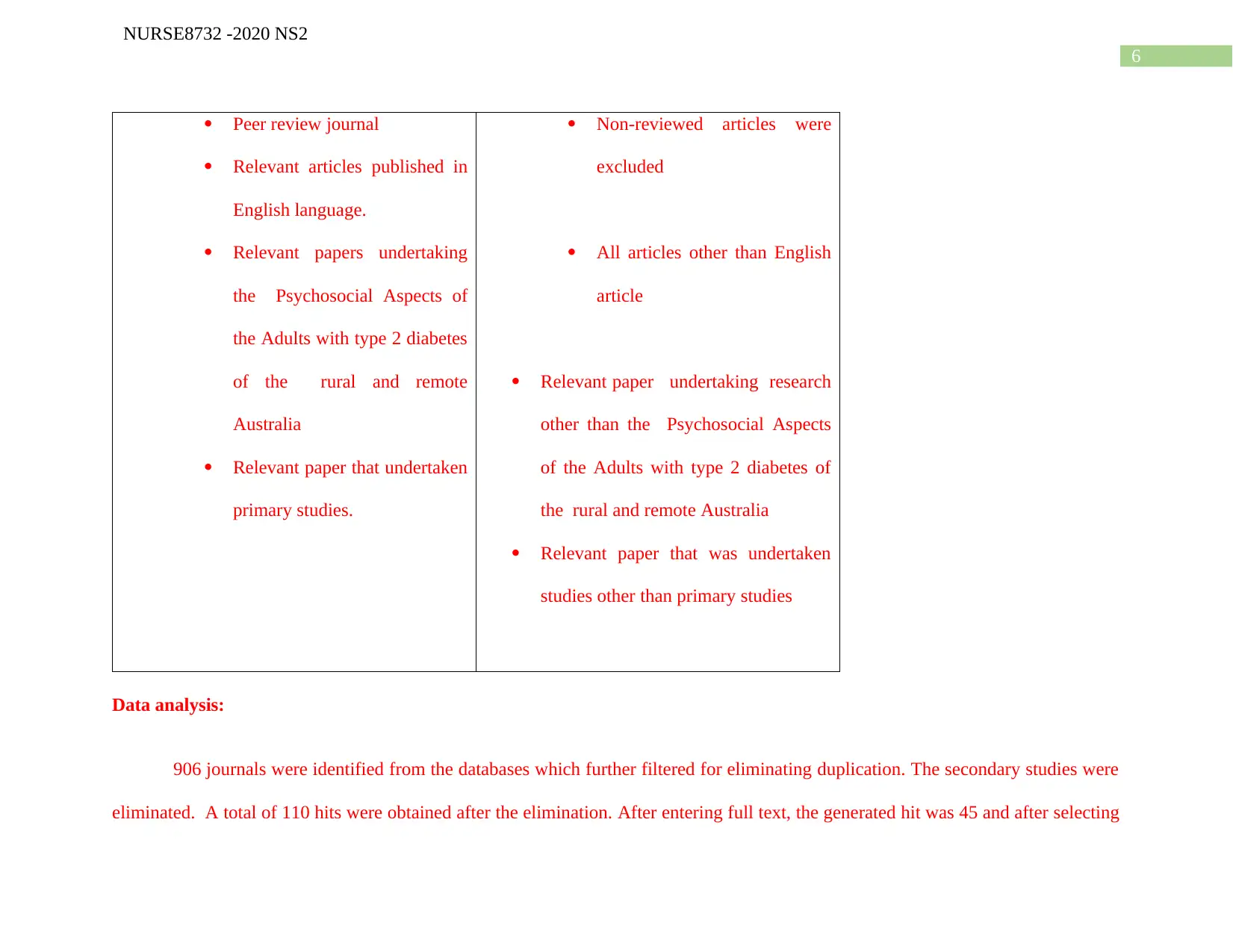
6
NURSE8732 -2020 NS2
Peer review journal
Relevant articles published in
English language.
Relevant papers undertaking
the Psychosocial Aspects of
the Adults with type 2 diabetes
of the rural and remote
Australia
Relevant paper that undertaken
primary studies.
Non-reviewed articles were
excluded
All articles other than English
article
Relevant paper undertaking research
other than the Psychosocial Aspects
of the Adults with type 2 diabetes of
the rural and remote Australia
Relevant paper that was undertaken
studies other than primary studies
Data analysis:
906 journals were identified from the databases which further filtered for eliminating duplication. The secondary studies were
eliminated. A total of 110 hits were obtained after the elimination. After entering full text, the generated hit was 45 and after selecting
NURSE8732 -2020 NS2
Peer review journal
Relevant articles published in
English language.
Relevant papers undertaking
the Psychosocial Aspects of
the Adults with type 2 diabetes
of the rural and remote
Australia
Relevant paper that undertaken
primary studies.
Non-reviewed articles were
excluded
All articles other than English
article
Relevant paper undertaking research
other than the Psychosocial Aspects
of the Adults with type 2 diabetes of
the rural and remote Australia
Relevant paper that was undertaken
studies other than primary studies
Data analysis:
906 journals were identified from the databases which further filtered for eliminating duplication. The secondary studies were
eliminated. A total of 110 hits were obtained after the elimination. After entering full text, the generated hit was 45 and after selecting
Paraphrase This Document
Need a fresh take? Get an instant paraphrase of this document with our AI Paraphraser
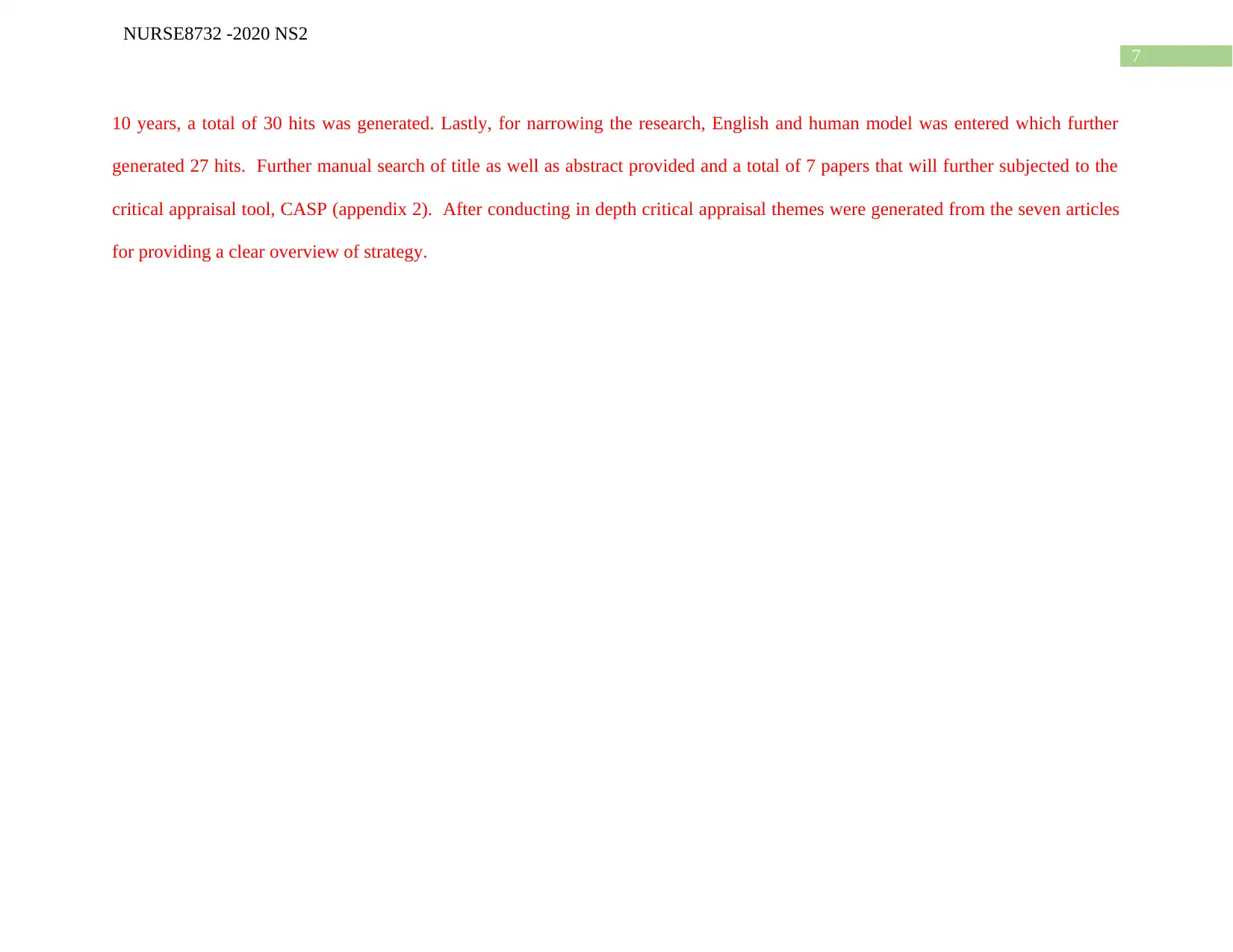
7
NURSE8732 -2020 NS2
10 years, a total of 30 hits was generated. Lastly, for narrowing the research, English and human model was entered which further
generated 27 hits. Further manual search of title as well as abstract provided and a total of 7 papers that will further subjected to the
critical appraisal tool, CASP (appendix 2). After conducting in depth critical appraisal themes were generated from the seven articles
for providing a clear overview of strategy.
NURSE8732 -2020 NS2
10 years, a total of 30 hits was generated. Lastly, for narrowing the research, English and human model was entered which further
generated 27 hits. Further manual search of title as well as abstract provided and a total of 7 papers that will further subjected to the
critical appraisal tool, CASP (appendix 2). After conducting in depth critical appraisal themes were generated from the seven articles
for providing a clear overview of strategy.
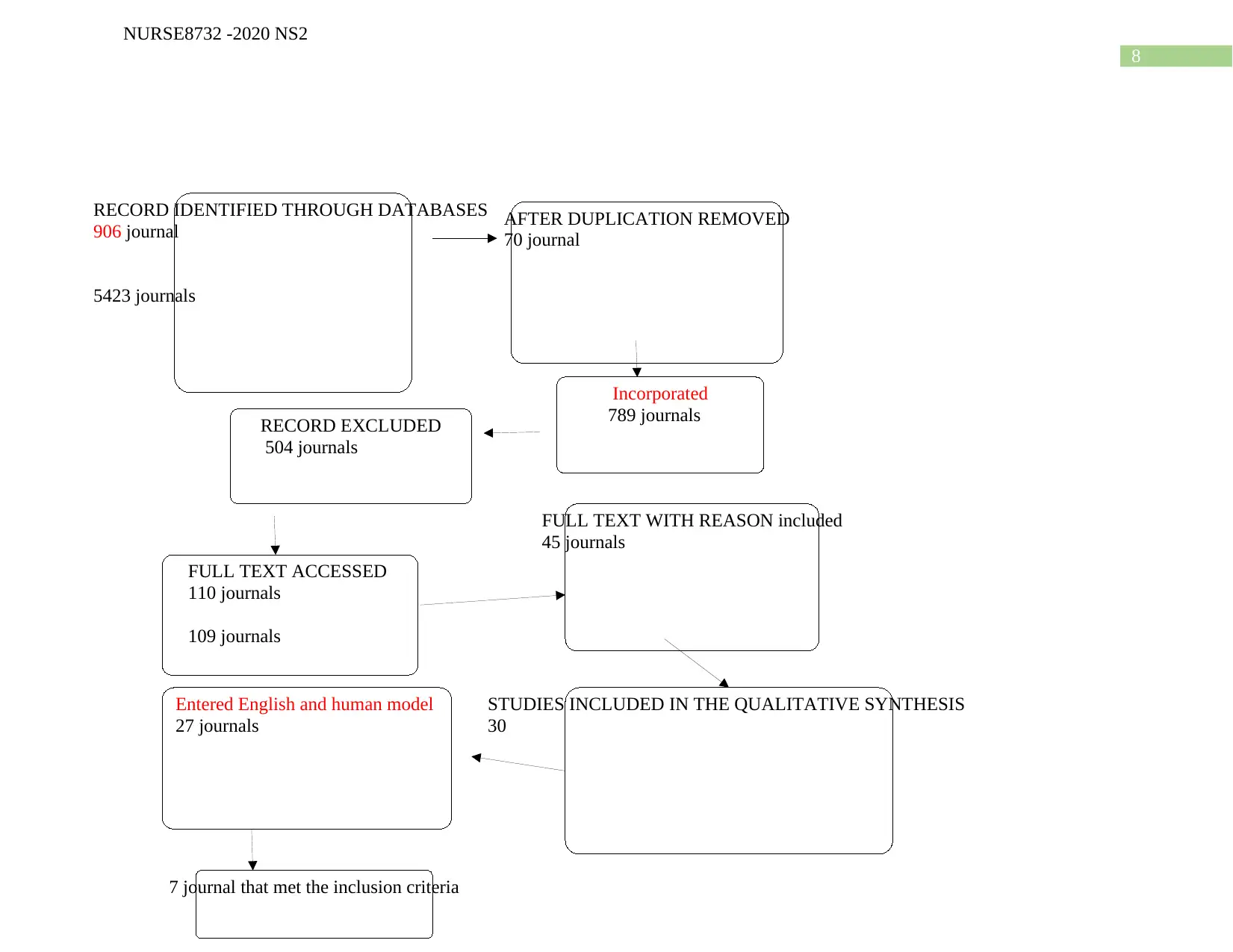
8
NURSE8732 -2020 NS2
RECORD IDENTIFIED THROUGH DATABASES
906 journal
5423 journals
AFTER DUPLICATION REMOVED
70 journal
Incorporated
789 journals
RECORD EXCLUDED
504 journals
FULL TEXT ACCESSED
110 journals
109 journals
FULL TEXT WITH REASON included
45 journals
STUDIES INCLUDED IN THE QUALITATIVE SYNTHESIS
30
Entered English and human model
27 journals
7 journal that met the inclusion criteria
NURSE8732 -2020 NS2
RECORD IDENTIFIED THROUGH DATABASES
906 journal
5423 journals
AFTER DUPLICATION REMOVED
70 journal
Incorporated
789 journals
RECORD EXCLUDED
504 journals
FULL TEXT ACCESSED
110 journals
109 journals
FULL TEXT WITH REASON included
45 journals
STUDIES INCLUDED IN THE QUALITATIVE SYNTHESIS
30
Entered English and human model
27 journals
7 journal that met the inclusion criteria
⊘ This is a preview!⊘
Do you want full access?
Subscribe today to unlock all pages.

Trusted by 1+ million students worldwide
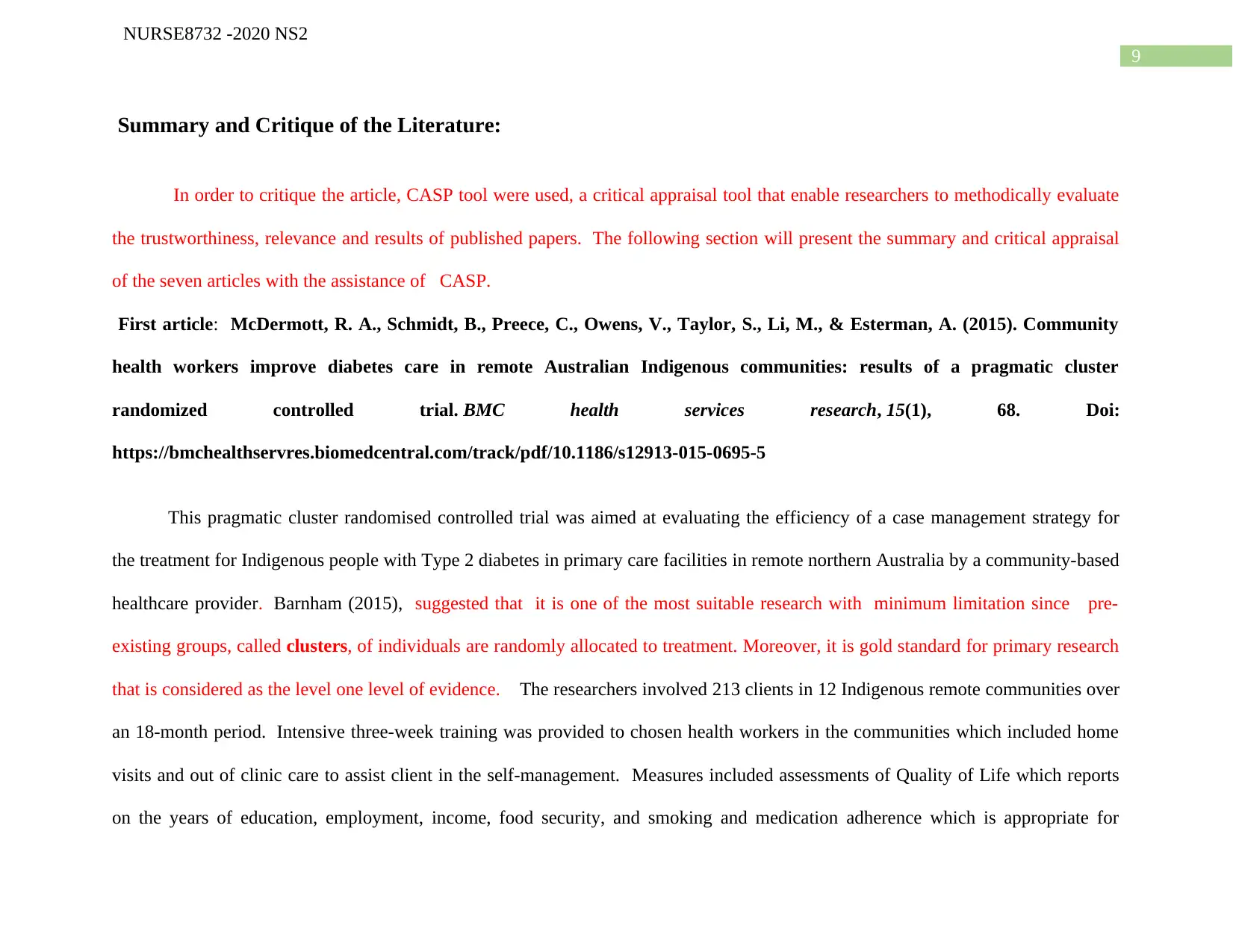
9
NURSE8732 -2020 NS2
Summary and Critique of the Literature:
In order to critique the article, CASP tool were used, a critical appraisal tool that enable researchers to methodically evaluate
the trustworthiness, relevance and results of published papers. The following section will present the summary and critical appraisal
of the seven articles with the assistance of CASP.
First article: McDermott, R. A., Schmidt, B., Preece, C., Owens, V., Taylor, S., Li, M., & Esterman, A. (2015). Community
health workers improve diabetes care in remote Australian Indigenous communities: results of a pragmatic cluster
randomized controlled trial. BMC health services research, 15(1), 68. Doi:
https://bmchealthservres.biomedcentral.com/track/pdf/10.1186/s12913-015-0695-5
This pragmatic cluster randomised controlled trial was aimed at evaluating the efficiency of a case management strategy for
the treatment for Indigenous people with Type 2 diabetes in primary care facilities in remote northern Australia by a community-based
healthcare provider. Barnham (2015), suggested that it is one of the most suitable research with minimum limitation since pre-
existing groups, called clusters, of individuals are randomly allocated to treatment. Moreover, it is gold standard for primary research
that is considered as the level one level of evidence. The researchers involved 213 clients in 12 Indigenous remote communities over
an 18-month period. Intensive three-week training was provided to chosen health workers in the communities which included home
visits and out of clinic care to assist client in the self-management. Measures included assessments of Quality of Life which reports
on the years of education, employment, income, food security, and smoking and medication adherence which is appropriate for
NURSE8732 -2020 NS2
Summary and Critique of the Literature:
In order to critique the article, CASP tool were used, a critical appraisal tool that enable researchers to methodically evaluate
the trustworthiness, relevance and results of published papers. The following section will present the summary and critical appraisal
of the seven articles with the assistance of CASP.
First article: McDermott, R. A., Schmidt, B., Preece, C., Owens, V., Taylor, S., Li, M., & Esterman, A. (2015). Community
health workers improve diabetes care in remote Australian Indigenous communities: results of a pragmatic cluster
randomized controlled trial. BMC health services research, 15(1), 68. Doi:
https://bmchealthservres.biomedcentral.com/track/pdf/10.1186/s12913-015-0695-5
This pragmatic cluster randomised controlled trial was aimed at evaluating the efficiency of a case management strategy for
the treatment for Indigenous people with Type 2 diabetes in primary care facilities in remote northern Australia by a community-based
healthcare provider. Barnham (2015), suggested that it is one of the most suitable research with minimum limitation since pre-
existing groups, called clusters, of individuals are randomly allocated to treatment. Moreover, it is gold standard for primary research
that is considered as the level one level of evidence. The researchers involved 213 clients in 12 Indigenous remote communities over
an 18-month period. Intensive three-week training was provided to chosen health workers in the communities which included home
visits and out of clinic care to assist client in the self-management. Measures included assessments of Quality of Life which reports
on the years of education, employment, income, food security, and smoking and medication adherence which is appropriate for
Paraphrase This Document
Need a fresh take? Get an instant paraphrase of this document with our AI Paraphraser
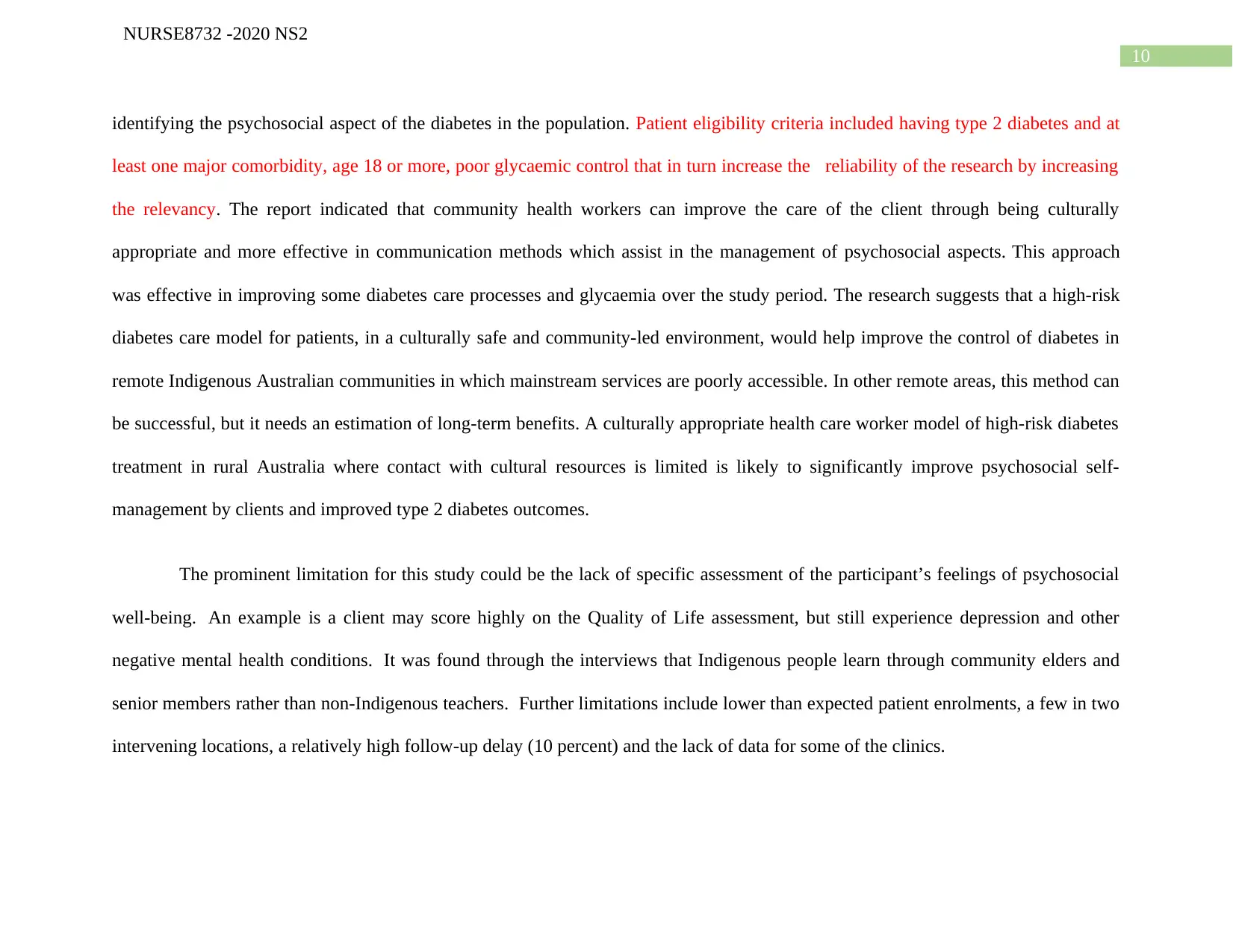
10
NURSE8732 -2020 NS2
identifying the psychosocial aspect of the diabetes in the population. Patient eligibility criteria included having type 2 diabetes and at
least one major comorbidity, age 18 or more, poor glycaemic control that in turn increase the reliability of the research by increasing
the relevancy. The report indicated that community health workers can improve the care of the client through being culturally
appropriate and more effective in communication methods which assist in the management of psychosocial aspects. This approach
was effective in improving some diabetes care processes and glycaemia over the study period. The research suggests that a high-risk
diabetes care model for patients, in a culturally safe and community-led environment, would help improve the control of diabetes in
remote Indigenous Australian communities in which mainstream services are poorly accessible. In other remote areas, this method can
be successful, but it needs an estimation of long-term benefits. A culturally appropriate health care worker model of high-risk diabetes
treatment in rural Australia where contact with cultural resources is limited is likely to significantly improve psychosocial self-
management by clients and improved type 2 diabetes outcomes.
The prominent limitation for this study could be the lack of specific assessment of the participant’s feelings of psychosocial
well-being. An example is a client may score highly on the Quality of Life assessment, but still experience depression and other
negative mental health conditions. It was found through the interviews that Indigenous people learn through community elders and
senior members rather than non-Indigenous teachers. Further limitations include lower than expected patient enrolments, a few in two
intervening locations, a relatively high follow-up delay (10 percent) and the lack of data for some of the clinics.
NURSE8732 -2020 NS2
identifying the psychosocial aspect of the diabetes in the population. Patient eligibility criteria included having type 2 diabetes and at
least one major comorbidity, age 18 or more, poor glycaemic control that in turn increase the reliability of the research by increasing
the relevancy. The report indicated that community health workers can improve the care of the client through being culturally
appropriate and more effective in communication methods which assist in the management of psychosocial aspects. This approach
was effective in improving some diabetes care processes and glycaemia over the study period. The research suggests that a high-risk
diabetes care model for patients, in a culturally safe and community-led environment, would help improve the control of diabetes in
remote Indigenous Australian communities in which mainstream services are poorly accessible. In other remote areas, this method can
be successful, but it needs an estimation of long-term benefits. A culturally appropriate health care worker model of high-risk diabetes
treatment in rural Australia where contact with cultural resources is limited is likely to significantly improve psychosocial self-
management by clients and improved type 2 diabetes outcomes.
The prominent limitation for this study could be the lack of specific assessment of the participant’s feelings of psychosocial
well-being. An example is a client may score highly on the Quality of Life assessment, but still experience depression and other
negative mental health conditions. It was found through the interviews that Indigenous people learn through community elders and
senior members rather than non-Indigenous teachers. Further limitations include lower than expected patient enrolments, a few in two
intervening locations, a relatively high follow-up delay (10 percent) and the lack of data for some of the clinics.
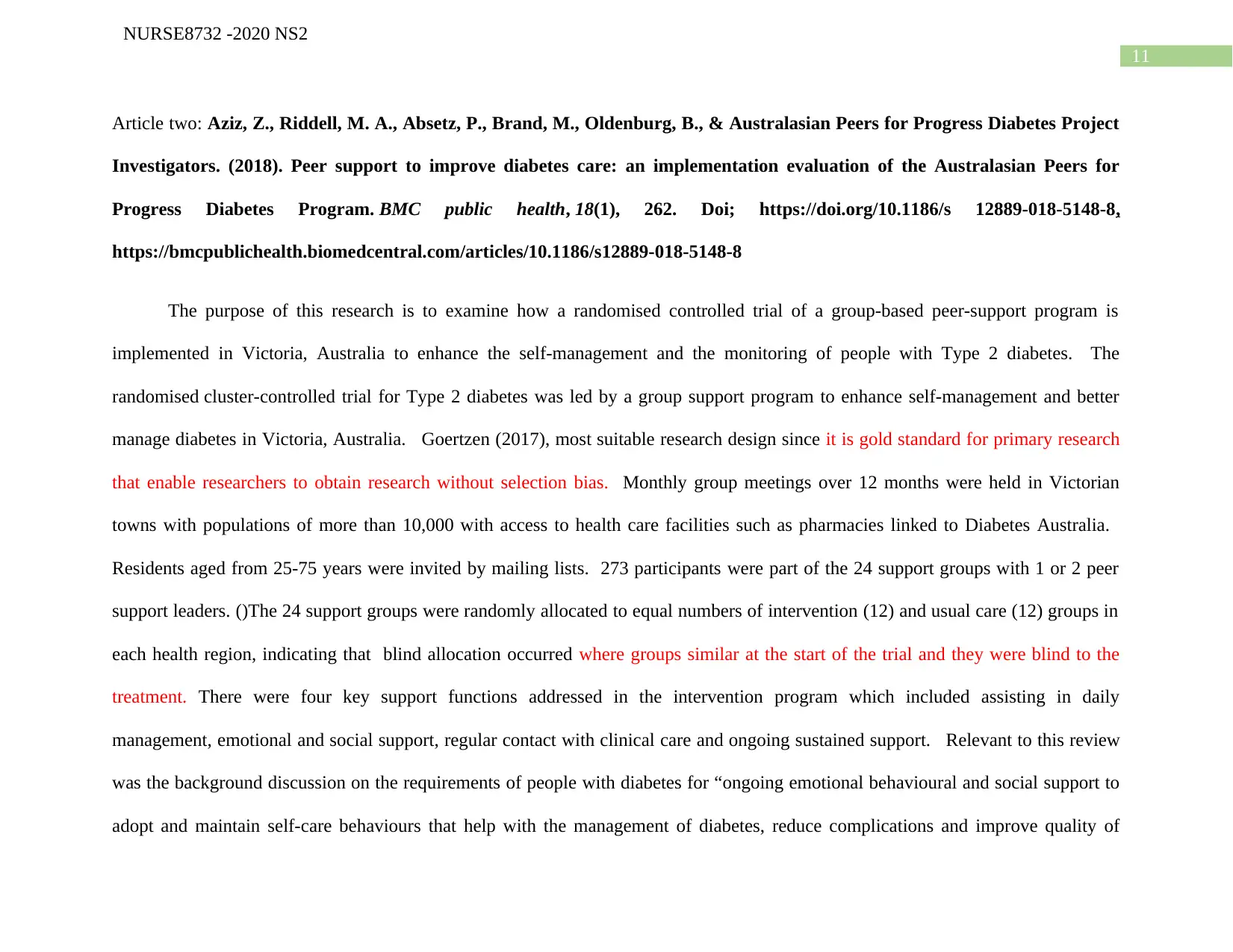
11
NURSE8732 -2020 NS2
Article two: Aziz, Z., Riddell, M. A., Absetz, P., Brand, M., Oldenburg, B., & Australasian Peers for Progress Diabetes Project
Investigators. (2018). Peer support to improve diabetes care: an implementation evaluation of the Australasian Peers for
Progress Diabetes Program. BMC public health, 18(1), 262. Doi; https://doi.org/10.1186/s 12889-018-5148-8,
https://bmcpublichealth.biomedcentral.com/articles/10.1186/s12889-018-5148-8
The purpose of this research is to examine how a randomised controlled trial of a group-based peer-support program is
implemented in Victoria, Australia to enhance the self-management and the monitoring of people with Type 2 diabetes. The
randomised cluster-controlled trial for Type 2 diabetes was led by a group support program to enhance self-management and better
manage diabetes in Victoria, Australia. Goertzen (2017), most suitable research design since it is gold standard for primary research
that enable researchers to obtain research without selection bias. Monthly group meetings over 12 months were held in Victorian
towns with populations of more than 10,000 with access to health care facilities such as pharmacies linked to Diabetes Australia.
Residents aged from 25-75 years were invited by mailing lists. 273 participants were part of the 24 support groups with 1 or 2 peer
support leaders. ()The 24 support groups were randomly allocated to equal numbers of intervention (12) and usual care (12) groups in
each health region, indicating that blind allocation occurred where groups similar at the start of the trial and they were blind to the
treatment. There were four key support functions addressed in the intervention program which included assisting in daily
management, emotional and social support, regular contact with clinical care and ongoing sustained support. Relevant to this review
was the background discussion on the requirements of people with diabetes for “ongoing emotional behavioural and social support to
adopt and maintain self-care behaviours that help with the management of diabetes, reduce complications and improve quality of
NURSE8732 -2020 NS2
Article two: Aziz, Z., Riddell, M. A., Absetz, P., Brand, M., Oldenburg, B., & Australasian Peers for Progress Diabetes Project
Investigators. (2018). Peer support to improve diabetes care: an implementation evaluation of the Australasian Peers for
Progress Diabetes Program. BMC public health, 18(1), 262. Doi; https://doi.org/10.1186/s 12889-018-5148-8,
https://bmcpublichealth.biomedcentral.com/articles/10.1186/s12889-018-5148-8
The purpose of this research is to examine how a randomised controlled trial of a group-based peer-support program is
implemented in Victoria, Australia to enhance the self-management and the monitoring of people with Type 2 diabetes. The
randomised cluster-controlled trial for Type 2 diabetes was led by a group support program to enhance self-management and better
manage diabetes in Victoria, Australia. Goertzen (2017), most suitable research design since it is gold standard for primary research
that enable researchers to obtain research without selection bias. Monthly group meetings over 12 months were held in Victorian
towns with populations of more than 10,000 with access to health care facilities such as pharmacies linked to Diabetes Australia.
Residents aged from 25-75 years were invited by mailing lists. 273 participants were part of the 24 support groups with 1 or 2 peer
support leaders. ()The 24 support groups were randomly allocated to equal numbers of intervention (12) and usual care (12) groups in
each health region, indicating that blind allocation occurred where groups similar at the start of the trial and they were blind to the
treatment. There were four key support functions addressed in the intervention program which included assisting in daily
management, emotional and social support, regular contact with clinical care and ongoing sustained support. Relevant to this review
was the background discussion on the requirements of people with diabetes for “ongoing emotional behavioural and social support to
adopt and maintain self-care behaviours that help with the management of diabetes, reduce complications and improve quality of
⊘ This is a preview!⊘
Do you want full access?
Subscribe today to unlock all pages.

Trusted by 1+ million students worldwide
1 out of 41
Related Documents
Your All-in-One AI-Powered Toolkit for Academic Success.
+13062052269
info@desklib.com
Available 24*7 on WhatsApp / Email
![[object Object]](/_next/static/media/star-bottom.7253800d.svg)
Unlock your academic potential
Copyright © 2020–2026 A2Z Services. All Rights Reserved. Developed and managed by ZUCOL.





